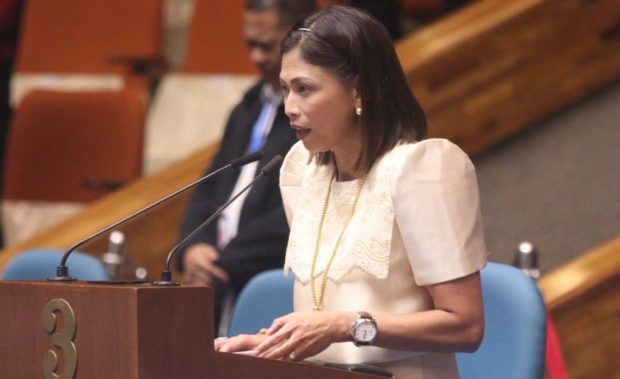
Marikina City Rep. Stella Luz Quimbo. (Photo from her Facebook account)
MANILA, Philippines — Why do officials of the Philippine Health Insurance Corp. (PhilHealth) keep saying that the state firm is about to die despite its being “in the pink of health”?
Marikina Second District Rep. Stella Quimbo stressed this point as she scolded PhilHealth officials during the deliberation of the House Committee on Appropriations of the Department of Health (DOH) proposed budget for 2023,
The PhilHealth officials were led by officer-in-charge Eli Dino Santos and senior vice president Gregorio Rulloda
Quimbo, who is an economist, asked how much PhilHealth’s net income was for 2021 to properly gauge its fund life.
PhilHealth officials said the firm had P171.2 billion worth of income in 2021. With benefit expenses of P140.2 billion deducted, its gross margin was P31 billion. With operational expenses of P7.8 billion deducted from that and with other sources of income worth P9.7 billion added, PhilHealth had a net income of P32.8 billion.
“So that’s good news — because every time we ask about the actuarial life of PhilHealth, you always tell us that PhilHealth is about to die,” Quimbo, who is the vice chairman of the appropriations committee, said in Filipino.
“Earlier, the actuarial life was also asked, but the president was not able to answer,” she went on. “What he said was that, if the subsidy would continue, it could last up to 2027.”
Quimbo warned PhilHealth officials about making such pronouncements. She said could make contributing members panic as they might think that PhilHealth’s coverage would have an expiration date.
“So these kinds of pronouncements are nerve-wracking because Filipinos might think that PhilHealth is losing money. So in my opinion, since this is a going concern, when you are asked about the life of PhilHealth, the answer should be‘ indefinite,’ right?” Quimbo said.
“Because this is a going concern, isn’t it right that every time you would introduce benefit payments, that is subject to an actuarial validation right?” she said.
Santos agreed, confirming that Quimbo’s assessment that nothing bad would happen to PhilHealth’s fund life as long as it would not pay benefits beyond its capacity.
Santos also noted that, if asked again, he would say that PhilHealth would last forever.
“So that means in theory at least, if you would not do anything damaging to the fund, nothing wrong would happen? Because as of now, with the way you are earning, the only way that the fund would die is if you would give away benefits way more than what you have, right? And you won’t allow that, right? So in other words, what is the actuarial life of PhilHealth?” Quimbo asked.
“Madam Chairperson, when I was asked the same question, I answered that PhilHealth will last forever, Madam Chairperson,” Santos replied.
“Thank you for the reassurance,” Quimbo said. “And I hope that beginning today, we won’t issue any statement putting a deadline on the fund life of PhilHealth because members who are contributing are really scared.”
Earlier in the same committee hearing, Santos told the panel that they were looking at two scenarios — one in which PhilHealth’s fund life would last only until 2027 and one in which it would go beyond that.
Santos said that, even if PhilHealth would receive contributions from the Philippine Amusement and Gaming Corp. (Pagcor) and the Philippine Charity Sweepstakes Office (PCSO), it would only last by 2027.
But if it would receive more funding due to higher sin tax revenues, the fund life would stretch past 2027.
“We have another scenario, Madam Chairperson. If we will only receive Pagcor and PCSO pork for 2023, per DBM-recommended [Department of Budget and Management] NEP [National Expenditure Program], the subsequent years, we will have until 2027, Madam Chairperson,” Santos said.
“Again, on the side of PhilHealth, we really need the support of the national government in providing for the subsidy. We really need the support as provided under the Universal Healthcare Law, coming from the PCSO, and the Pagcor as well as the sin tax […] If we receive all this support then definitely, then PhilHealth will definitely last beyond 2027,” he added.
This was not the first time that PhilHealth revealed that its fund life would only last until 2027.
Last September 2021, PhilHealth’s acting senior vice president, Nerissa Santiago, said PhilHealth would last until 2027 only if Filipino taxpayers would not pay for higher premiums.
The net loss for 2021 was expected to be around P57 billion.
Santiago made the grim prediction despite an increase in the contribution implemented last June — which was retroactive from January 2022.
Towards the end of the budget deliberations, Quimbo again asked about PhilHealth’s current reserve fund,
The officials said was currently at P188.4 billion — way above the minimum requirement by the law, which is an amount that would enable the firm to pay off obligations for a minimum of six months.
“And the minimum required is six months, right? Six months of minimum. We have two years. Again I reiterate my point earlier that it is in the pink of health. PhilHealth is very much alive,” Quimbo ended.
RELATED STORIES
PhilHealth will still last only until 2027 even if Pagcor, PCSO give funding – exec
PhilHealth has 5 years to live, exec claims
PhilHealth may collapse by 2027; projected 2021 net loss at P57B — exec
PhilHealth contribution hike starting June retroactive from January